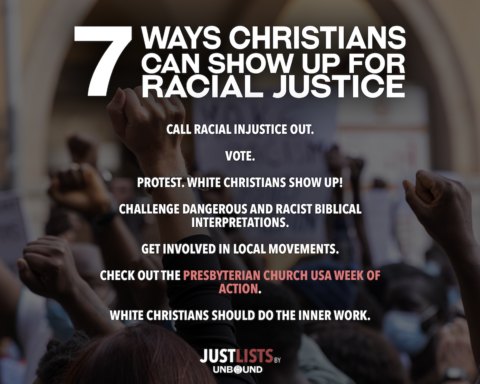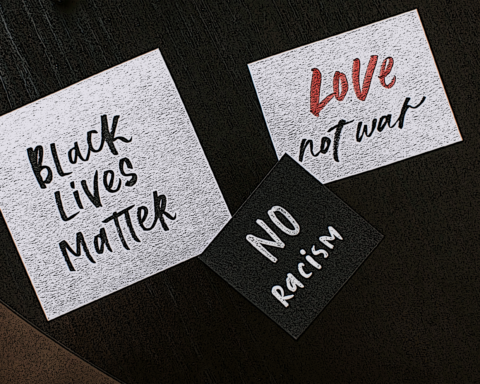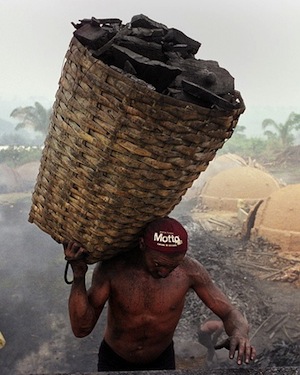 The following sermon was preached by Rev. Patrick Heery on November 13, 2013, at the Presbyterian Center’s weekly chapel service. We lift it up this week on Unbound in commemoration of the biblical “Massacre of the Infants,” even as we remember the present-day altars upon which so many of our children continue to be sacrificed.
The following sermon was preached by Rev. Patrick Heery on November 13, 2013, at the Presbyterian Center’s weekly chapel service. We lift it up this week on Unbound in commemoration of the biblical “Massacre of the Infants,” even as we remember the present-day altars upon which so many of our children continue to be sacrificed.
Sermon Text: Nehemiah 5:1-13
(The following prayer is based on the above text)
Prayer of Lamentation
[ezcol_1half]Reader 1: We were afraid
Reader 2: We had no other choice
Reader 1: Sacrifices had to be made
Reader 2: For the greater good
Reader 1: For the greater good, of course
Reader 2: Cut off the finger, save the hand
Reader 1: We sacrificed our children
Reader 2: No, not all, just some of them
Reader 1: Turned them over to hunger, to homelessness
Reader 2: To prison, to schools not unlike prisons
Reader 1: To silence, like venom pumped into their veins
Reader 2: To bullets, to unceasing images of bodily perfection that wound just as deep
[/ezcol_1half] [ezcol_1half_end]Reader 1: To a planet choking on its own air
Reader 2: To jars and cages and wings clipped
Reader 1: To debt unabated
Reader 2: To barbed wire embedded in skin color, and in love
Reader 1: (Especially if you end up loving the wrong person of the wrong gender)
Reader 2: Cut off the finger, save the hand
Reader 1: Save our rights
Reader 2: Save our wallets
Reader 1: Save the church
Reader 2: But funny thing we are just now learning:
Reader 1: Cut off the finger, and the whole hand hurts.[/ezcol_1half_end]
Sermon

We’ve come into the story in media res. The scene opens with Nehemiah, a Jew and servant to the king of Persia, crouched over here in the corner, crying his eyes out. He’s just learned that his people, after enduring years of exile, have returned only to find their home in shambles. So Nehemiah sets out to rebuild the walls of Jerusalem, walls to keep evil at bay. Only later does he begin to realize that evil is not just something out there, among Judah’s enemies; it’s right here, in the hearts of his own people, and it’s going to take more than walls of stone and mortar to drive it out. That’s where our text this morning picks up.
The people are starving. Many have had to take mortgages out on their land in order to feed their families, but now the produce of the land doesn’t belong to them, meaning they have to take out more loans just to keep alive. Families have become so desperate that they have begun to sell their own children into slavery and prostitution. But it gets worse: this isn’t the result of the predatory lending and interest rates of foreign merchants; no, this is the deliberate action of other Jews. A few wealthy families, fearful for their own futures, have gathered to themselves almost all of the land, and the rest of the returned exiles are suffering at their expense.
___________________________________________
The evil is the fear that has slithered into their bellies, reached up their throats, and taken hold of them. The fear that there is not enough; the fear that births the cold rationality that justifies sacrificing some of God’s children so that other children of God might live.
___________________________________________
When Nehemiah learns what’s happening, he takes his judgment and his call for reform, not to the families selling their children into slavery, but to the rulers and nobles who have made this evil possible. Because the evil here is not the people; it’s not even chiefly this terrible act of selling their own children. The evil is the fear that has slithered into their bellies, reached up their throats, and taken hold of them. The fear that there is not enough; the fear that births the cold rationality that justifies sacrificing some of God’s children so that other children of God might live. Families face an awful choice: to be righteous and let all of the children die, or sinfully sell a few into slavery and let the others live. So they sacrifice the few for the many; cut off the finger to save the hand.

These are not villains. These are parents who love their children, mothers who carried these children in their wombs and risked their own death in giving birth, parents who have watched their children grow up, play with the sheep, tend the garden, tug at their cloaks. These are Jews, a people who see children as a blessing and a sign of the covenant with God. They are survivors of an exile that tried to rob them of everything it meant to be Jewish. They do not lightly hand over their children.
Terrified that there will never be enough, it was apparently no longer sufficient for the rulers just to have a full stomach; they had to have storehouses of food, acres of land, armies to protect that land, clear social markers of who has access and who doesn’t, anything and everything to secure the world’s resources for me and mine.
The impoverished people of Judah accepted this premise. They could have questioned the right of the rich to charge such high interest rates and seize their land; they could have promulgated a different philosophy and said, “No – we are in this together.” Instead, they too seek to seize their pieces, albeit much smaller, of the pie. They do just what has been done to them: sacrifice others so that they might survive. And here we are, 2,500 years later, doing the same thing.
 As a nation, as a church, as a people, we look around us and see a crumbling world. We face our own diminishment. Anxiety sets in.
As a nation, as a church, as a people, we look around us and see a crumbling world. We face our own diminishment. Anxiety sets in.
Populations are growing. There’s not enough food, or water, or land, or minerals to go around – or so we think. There aren’t enough jobs, scholarships, colleges, “nice” neighborhoods. And so some children – particularly those who happen to have brown skin – are funneled out of school and into prison (thanks to some convenient zero tolerance policies and minimum sentencing laws). Children are incarcerated because, well, it creates jobs for the parents of other children; because it maintains the safety of other children; because it maintains a racial and class order that benefits – yes, that’s right – other children.
___________________________________________
Everyday we’re feeding children into this machine. And it’s not just society. It’s the church too.
___________________________________________
Children are trapped in cycles of poverty so that we can maintain a free market. Sequestration cuts are made to Headstart, sacrificing critical preschool education for children, in the name of political compromise. Boys and girls are made to hate and starve their bodies, straighten their hair, tuck in those lips, all to further an economic machine selling the “perfect” body. Children are being shot on our streets and in our schools all so that we can preserve our right to bear arms without restriction – and to profit from that right. To preserve our way of life, we sell out children yet unborn who will inherit a devastated planet.
 Everyday we’re feeding children into this machine. And it’s not just society. It’s the church too. The church is racked by division: congregations are leaving; young adults aren’t coming back; our coffers are growing emptier; society isn’t listening to us anymore. And so some good Presbyterians suggest that we shouldn’t talk about racial or gender justice, or sexuality and LGBT equality; we should be focusing on mission and charity and things we agree on. When such words are uttered, we should hear the fear creeping back in – the calculation of who exactly is expendable. We’ll sacrifice the questioning and LGBT children in our congregations – the children who wait in silence for some word that they are loved and welcome, the children kicked out of homes and onto streets, the children who need us – all because something more important is at stake: the harmony of the church. And of course the people who utter such words are afraid that if we care too much for these children, we’ll sacrifice children across the world who depend on a church with enough capacity to do effective mission. All the while, others of us will righteously declare good riddance to the congregations that are leaving, forgetting that there are children sitting in their pews too, children who needed us.
Everyday we’re feeding children into this machine. And it’s not just society. It’s the church too. The church is racked by division: congregations are leaving; young adults aren’t coming back; our coffers are growing emptier; society isn’t listening to us anymore. And so some good Presbyterians suggest that we shouldn’t talk about racial or gender justice, or sexuality and LGBT equality; we should be focusing on mission and charity and things we agree on. When such words are uttered, we should hear the fear creeping back in – the calculation of who exactly is expendable. We’ll sacrifice the questioning and LGBT children in our congregations – the children who wait in silence for some word that they are loved and welcome, the children kicked out of homes and onto streets, the children who need us – all because something more important is at stake: the harmony of the church. And of course the people who utter such words are afraid that if we care too much for these children, we’ll sacrifice children across the world who depend on a church with enough capacity to do effective mission. All the while, others of us will righteously declare good riddance to the congregations that are leaving, forgetting that there are children sitting in their pews too, children who needed us.
All the children we sacrifice for the greater good… or for our own good… or just because it’s easier. Because there’s not enough to go around, and someone’s going to have to get the short end of the straw.
___________________________________________
Cut off the finger, save the hand – save our rights, save our wallets, save the church. But funny thing we are just now learning: Cut off the finger, and the whole hand hurts.
___________________________________________
The perniciousness of this evil is that it convinces us that there is no other reality than this. What’s remarkable about Nehemiah is that he simply refuses to accept this reality and the dilemma it poses. He rejects the question: whom should we sacrifice? He instead proclaims an alternative reality: a community whose virtue and survival are determined by that community’s ability to care for all of its members, especially its children. But Nehemiah doesn’t just preach this alternative ethic and hope that the poor will be enlightened and choose a better path even if it means starving. He takes his message to the people enforcing, legislating, and preaching this reality of fear. He goes to Congress, to Wall Street, to our pulpits, perhaps even to the Presbyterian Center.
The surprising development is that, when Nehemiah tells the rulers to return the land (lawfully taken, mind you) to its original owners and to remit all debt, they listen – they actually do it! Of course, there’s one hitch: in the next chapter, they plot his demise. Because here’s the thing about this fear: it’s stronger than us.
 So, a few centuries later, God sends God’s own son. And if God was just another human being, this would be nothing more than another sacrifice of a child to save others. But because Jesus Christ and God the father, the mother, are one in substance and in will, this is not the coercive sacrifice of another; it is self-sacrifice. The scapegoat who volunteered. God meets the dilemma (which child will you sacrifice?) with God’s own self, an option the world never considered. Our God of grace freely offers a gift while our mindsets of fear were telling us there was already too little to go around. God intervenes, pays our debts, and refuses the sacrifice of any more children – God shields their bodies with her own.
So, a few centuries later, God sends God’s own son. And if God was just another human being, this would be nothing more than another sacrifice of a child to save others. But because Jesus Christ and God the father, the mother, are one in substance and in will, this is not the coercive sacrifice of another; it is self-sacrifice. The scapegoat who volunteered. God meets the dilemma (which child will you sacrifice?) with God’s own self, an option the world never considered. Our God of grace freely offers a gift while our mindsets of fear were telling us there was already too little to go around. God intervenes, pays our debts, and refuses the sacrifice of any more children – God shields their bodies with her own.
The amazing thing is that we actually could feed everyone in the world. We actually could provide education and healthcare to everyone in the world. It’s not that the reality of finitude is any less with us. It’s not that hard choices won’t sometimes have to be made, or that we’ll never have to choose the lesser of two evils. It’s that our response – thanks to this gift, to this grace – doesn’t have to be one of fear and avarice. We don’t have to clutch desperately at everything we can get our hands on, as if we could somehow fortify our position against the constant threat of diminishment. God has shown us that another response is possible. In the assurance that we are provided for, that we are cared for, we can meet the threats of finitude and fear with God’s gifts of abundance and grace. It’s time we made a stern refusal to put any more children up on that cross, for God, by breaking God’s very own body, has broken the cross.
*****
AUTHOR BIO: Rev. Patrick David Heery is an ordained teaching elder in the Presbyterian Church (U.S.A.), the editor of Presbyterians Today, and the former managing editor of Unbound.






Unbound Social